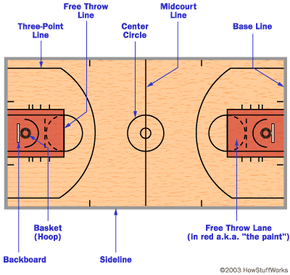Court and Equipment
Basketball can be played anywhere as long as there is a hoop mounted to a pole or wall and a ball to shoot through it. The basic idea could hardly be simpler. The two teams want to do two things:
- Get the ball through the opposing team's basket as much as possible (offense)
- Stop the opposing team from doing the same thing (defense)
As soon as one team has the ball, that team is the offense and the other team is the defense. The offense tries to position players to take a shot (throw the ball through the hoop). The defense players position themselves to block these shots. Offense players move around the basket and cut past defense players (abruptly changing direction to get past the defense) until they can set up a reasonably clear shot.
Advertisement
The way all this plays out largely depends on the court. Dimensions of the court and other equipment vary depending on the level of play. For our purposes, we will look at the National Basketball Association's (NBA) regulation equipment.
In its original form, when peach baskets were used, contestants climbed up a ladder to retrieve the ball after making a basket. Baskets are still used in basketball, but have evolved to eliminate the manual retrieval of the ball. Today's basket is an 18-inch-diameter (46 cm) metal rim, with a 15- or 18-inch-long (38 or 46 cm), open-ended nylon net extending below it.
The rim is actually about twice the diameter of a regulation basketball. In the NBA, the official ball is made of leather and has a circumference of 30 inches (76 cm) and a diameter of 9 inches (23 cm). Prior to play, the ball must be inflated to 7.5 to 8.5 pounds of pressure (0.51 to 0.57 atm).
An official basketball court, where competitive games are played, is a rectangle divided into two halves by the midcourt line. On each end of the court, baskets are mounted to a backboard and raised to a height of 10 feet (3 m). The backboard is a rectangle that is 6 feet (1.8 m) wide and 3.5 feet (1 m) tall. Players often shoot the ball at an angle so that it ricochets off the backboard and into the basket.
The court, in this case an NBA court, is 94 feet long and 50 feet wide (29 x 15 m). As possession alternates between teams, the teams run to opposite ends of the court. When a team's players are on offense, they are said to be in their frontcourt. If the team's players are on defense, they are in their backcourt.
Along the midcourt line is the center circle, which is 12 feet (3.7 m) in diameter. This circle is used for the tip-off, which starts the game. In a tip-off, a referee throws a ball into the air and one player from each team jumps to tip the ball to his/her respective teammates. The players jumping for the ball can tip, but not grab, the ball.
On each half of the court, there is a three-point line, which is an arced line painted on the floor. Within the three-point line, you find the key, which consists of the free-throw line and free-throw lane. The lane is sometimes called "the paint."
Behind the free-throw line there is a semicircle. The top of this semicircle is referred to as the top of the key. Along each side of the lane, there are four hash marks. These are called blocks, and designate spots where players must stand during foul shots.
